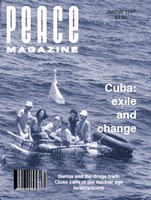
Peace Magazine Jan-Feb 1997, page 13. Some rights reserved.
Search for other articles by PMag staff here
At a Nov. 14 press conference, the Canadian Friends of Burma launched their new study of conditions in Burma's clothing industry: Dirty Clothes: Dirty System.
Written and researched by David Todd and funded by the United Steelworkers Humanity Fund and the Communications, Energy and Paper Workers Union of Canada, the study highlights the exploitive conditions of an industry where forced labor is used and where some workers put in 60-hour weeks for eight cents an hour. The State Law and Order Council (SLORC), the illegitimate military regime which has run Burma since 1988, uses profits from the manufacturing industry, including the clothing sector, to finance the purchase of arms and military equipment. A front organization, the Union of Myanmar Economic Holdings, operates as a mask for joint ventures between the military and foreign companies.
The SLORC's share of profits in the clothing sector may be as high as 16 percent, according to figures quoted in connection with Columbia Sportswear, an Oregon-based company which formerly sourced products in Burma. Other companies which have pulled out of Burma in recent years are Eddie Bauer, London Fog, and Levi Strauss. On the other hand, other high-profile Canadian retailers such as Zellers and Sears continue to use Burmese suppliers.
In spite of Foreign Affairs Minister Lloyd Axworthy's statements to the contrary, the report asserts that Canada does not really have a policy on Burma, and is not likely to develop one. It points out that developments in the General Agreement on Tariff and Trade will probably make it illegal for one state to discriminate against another (for instance, because of human rights concerns) unless documented proof can be supplied to support the action. The study suggests that Canada lacks the resources and inclination to take this sort of stand.
The report concludes by suggesting that the only effective approach is through pressure on companies dealing with Burma. A first step would be to approach retailers to encourage them to divest voluntarily. If that didn't work, a consumer boycott would follow. This happened in the case of Columbia Sportswear, and is supported by a consumers' survey showing that 80-90 percent of shoppers questioned would be prepared to pay a minimum of 10 percent more for their clothes if they were assured that they were manufactured under ethical conditions. Friends of Burma, 145 Spruce #206, Ottawa ON K1R 6P1 (613-237-8056; email cfob@web.net)by J.M. Dykstra

Peace Magazine Jan-Feb 1997, page 13. Some rights reserved.
Search for other articles by PMag staff here